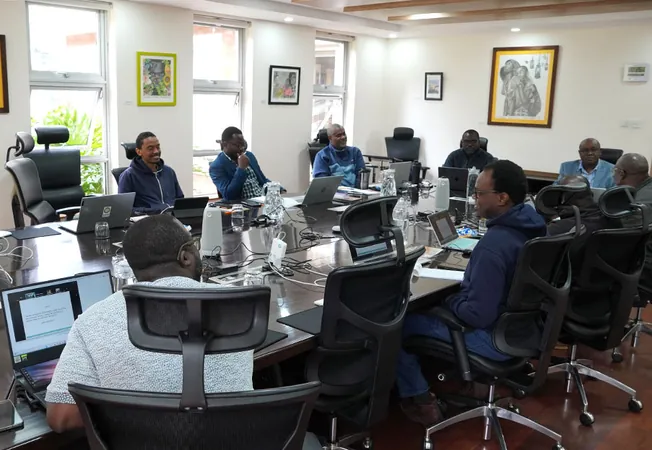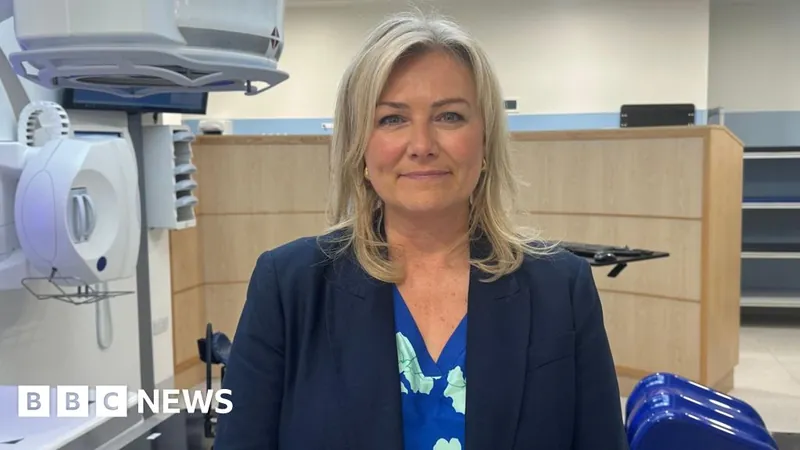
Revolutionizing Sustainability: Jesuits Unite for AI and Ecology Symposium
2025-09-22
Author: Wei
A Groundbreaking Gathering for a Just Future
In a remarkable blend of faith, scientific innovation, and ethical responsibility, the Jesuit Conference of Africa and Madagascar (JCAM) recently hosted the African Jesuits in Science (AJIS) Symposium 2025. Under the provocative theme, "Smart Planet, Just Future: AI and Ecology in the Fight for Sustainability," this event took place from August 4 to 8, 2025, at the Jesuit regional hub in Nairobi, known as AFRICAMA. This five-day symposium represents a pivotal moment in the African Church's dedication to leading the scientific charge for ecological justice.
Uniting Minds for the Greater Good
The symposium gathered an eclectic group of Jesuit scientists, scholars, and tech experts from across the continent and beyond. Together, they tackled how artificial intelligence (AI) and ecological breakthroughs could benefit societies grappling with the severe impacts of climate change, food insecurity, and inadequate health services. This initiative underscores the Society of Jesus' commitment to education, justice, and scientific exploration in our rapidly evolving world.
Innovative Research Taking Center Stage
Twelve groundbreaking projects were showcased, each interweaving technical advancements with real-world applications. Jesuits participating in STEM highlighted their cutting-edge research in four key areas: Quantum physics, biogas production, ethics in AI, and asteroid defense strategies. The discussions illuminated crucial ethical questions about the future of humanity, particularly for communities in the Global South.
Exploring the Cosmos and Beyond
The research sessions kicked off with exciting dialogues on quantum theory and space evolution. Jerome Paschal Manyahi from Mwenge Catholic University argued for merging quantum probability with biological evolution, suggesting that the sustainability of life intertwines with quantum mechanics. From a different angle, Williams Dhelonga delved into the potential of interstellar travel as a response to Earth's escalating ecological crisis. He considered propulsion technologies, ethical ramifications, and AI's role in ensuring humanity's survival as we reach for the stars.
AI: A Double-Edged Sword?
Several presentations critically examined the implications of AI in various sectors. Boniface Mbouzao revealed how AI has transformed education in Africa while highlighting regulatory, access, and funding challenges. Didier Cimalamungo introduced an ethical framework for ensuring that the AI revolution promotes ecological justice instead of aggravating existing harms. His insights prompted calls for Restorative Ecological Justice, urging a closer look at how AI’s mineral demand exacerbates ecological crises.
Transforming Health and Agriculture through AI
In laboratory research, Armel F. Setubi analyzed how electronic adherence monitors for Antiretroviral therapy could enhance patient compliance and aid public health. Meanwhile, Alain Pitti Djida and Fabrice Kameni presented innovative uses of AI in agricultural virology and disease detection, respectively. Their research is paving the way for better crop disease management, essential for safeguarding food security across Africa.
Impactful Initiatives for Local Communities
The final group of presentations focused on initiatives designed to create immediate social impact. Pierre Luhata Lokadi’s comparative study in Kinshasa demonstrated that household biogas could replace up to 76% of charcoal usage, promoting indoor air quality and reducing deforestation. Similarly, Herintsitohaina Mahasedra Ratsimbarison explored small hydropower's feasibility in Madagascar, promoting data-driven approaches that align with community needs and environmental sustainability.
A Vision for Global Change
These diverse contributions showcase the depth of African scientific inquiry and its increasing global significance. By applying AI in agriculture, modeling pandemics, and critically assessing new technologies, these scholars are not only addressing local challenges but also actively shaping international conversations about science, sustainability, and justice. This momentous symposium has ignited a dialogue that could redefine our approach to ecological stewardship and ethical innovation.

 Brasil (PT)
Brasil (PT)
 Canada (EN)
Canada (EN)
 Chile (ES)
Chile (ES)
 Česko (CS)
Česko (CS)
 대한민국 (KO)
대한민국 (KO)
 España (ES)
España (ES)
 France (FR)
France (FR)
 Hong Kong (EN)
Hong Kong (EN)
 Italia (IT)
Italia (IT)
 日本 (JA)
日本 (JA)
 Magyarország (HU)
Magyarország (HU)
 Norge (NO)
Norge (NO)
 Polska (PL)
Polska (PL)
 Schweiz (DE)
Schweiz (DE)
 Singapore (EN)
Singapore (EN)
 Sverige (SV)
Sverige (SV)
 Suomi (FI)
Suomi (FI)
 Türkiye (TR)
Türkiye (TR)
 الإمارات العربية المتحدة (AR)
الإمارات العربية المتحدة (AR)